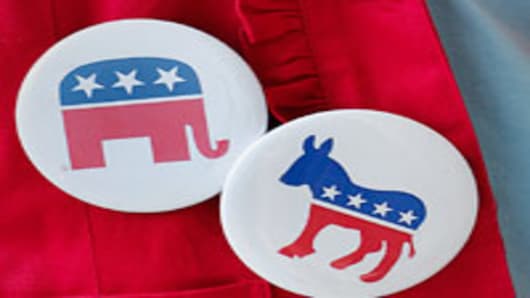For all the talk of a Republican landslide and a Democratic whipping in the 2010 midterms, it is worth noting that the midterm contestsare highly unpredictable political events.
And there’s rarely a middle-ground result. The change in Congressional seats is usually small or large and in nine of the last midterms, the party of the president has lost 10 percent or less of its House seats.
Put together, however, given those historical patterns and current circumstances—a bad economy—the most likely scenario is a Democratic rout.
It's The Economy
“Every election has lots of currents and counter currents,” says Larry Sabato, who heads the University of Virginia’s Center for Politics. “The economy is absolutely the black hole of this election. Most of the things in the headlines don’t drive votes. Fundamental forces drive elections and the economy is the fundamental here.”
But even a bad economy is no prescription for defeat.
In 1982, with unemployment breaking 10-percent two months ahead of the election, the bell may have tolled for President Ronald Reagan’s GOP, but the toll was hardly as bad as expected. Republicans lost about 13 percent of their House minority but added one seat to their healthy Senate majority.
"The environment was bad for the Republicans but the match-ups and the races favored them,” says Thomas Mann of the Brookings Institution.
The same may not apply to the Democrats this time around.
Now, with unemployment stuck around nine and a half percent, the smart money is predicting that the Democrats will lose enough seats to see their 256-178 majority in the House erased. They have a much better chance of holding on to the Senate, where they hold a 57-41 edge but 37 seats are in play.
Sabato's latest "Crystal-Ball" forecast is fairly representative.
“The overall trends are bad for the Democrats,” says John Fortier of the American Enterprise Institute.
Those include a president whose popularity has been steadily declining and what Fortier calls “wave elections, caused by periods of large discontent.”
Though voters may have been discontent with the the final years of the Bush administration, analysts say, there is no way for the Democrats to share—never mind shake—ownership of the bad economy.
“A fair-minded person would apportion blame,” says Sabato. “The collapse happened when Bush was president but no one remembers that.”
“I think they can say they’ve done some things,” adds Dean Baker, co-director of the Center for Economic and Policy Analysis. “At the same time, they cant’ tell the people things are good.”
That is basically the message the President has been making lately in what appears to be an effort to promote Democratic candidates across the country.
"The hole was so deep, some people out there are still hurting," Obama explained in a recent town hall on CNBC."I am confident that if we stay on a course that gets us back to old-fashioned values of hard work and responsibility and looking out for one another, that America will thrive."
Political analysts say there really isn’t any other issue. The economy equates to jobs and unemployment—and to a lesser extent, home foreclosures. Other issues—heath care, regulation, the deficit, immigration—are all a distant second.
Other Headwinds
Nevertheless, the GOP has prepared something of an election-year platform with its "Pledge To America", focusing on jobs, spending and taxes, along with a couple of social issues, which seems to take a page from the party's 1994 "Contract With America."
There may be other reasons for Democrats to be worried about their prospects
More than ever, midterm elections have become political oddities, with little or no bearing on elections past and future, say analysts.
This time aroundThe Tea Party is a factor in some races, such as Senate contests in Delaware and Nevada, upsetting the political establishment.
Some say the recent volatility in results represent an acceleration of the political cycle. Control of the House—and to a lesser extent, the Senate—has bounced back and forth between parties in recent years.
“The pendulum swing is a permanent fixture in American elections now,” says Sabato. "The Democrats had two great election years, 2006 and 2008.”
Then there is the more fundamental issue of checks and balances between the branches of government.
“In 1995 Clinton was put to the test and responded pretty darn well and went on to do his best legislative work with a Republican majority that he couldn’t do with his Democratic majority,” says Bill Frenzel, a former ten-term GOP Congressman, now with the Cato Institute. “Our system kind of forces these so-called checks and balances when the parties themselves don’t provide it.”
Which makes for something of a self-correcting election process.
Big swings in the party composition of the House are more common than the Senate, but 2010 could be one of those rare years. Fourteen Senate seats —seven from each party—are open.
“It’s a little larger than usual,” says Mike Tanner, senior fellow at the Cato Institute, who adds that “Senate races are often more competitive than House seats.”
Most of the Senate openings are due to retirement. The retirees include Democrats Chris Dodd (Conn.) Byron Dorgan (N.D.) and Evan Bayh (Ind.) and Republicans Jim Bunning (Ky.), Judd Gregg (N.H.) and George Voinovich (Ohio). Key seats inPennsylvania,Nevada, Colorado, Florida, Wisconsin, Delaware, Utah and Washington State are up for grabs to varying degrees.
Twenty-three incumbent senators—a dozen of them Democrats—are seeking re-election. Some, such as Democrat Russell Feingold of Wisconsin, are looking at what was once unimaginable—defeat.
In the House, longtime key Democratic players such as Paul Kanjorski (Pa.), John Spratt (S.C.)and Ike Skelton (Mi.) are in tough re-election races, while David Obey (Wisc.) opted to retire.
“The only thing Democrats can hope for in the House and Senate is that they field good candidates in some races and are well funded and run good campaigns and hold off the GOP advantage,” says Mann.
In many cases, even hope may be inappropriate.
“Its hard to turn things around,” says Mike Tanner, senior fellow at the Cato Institute. “Most people tend to lock in their votes early.”




